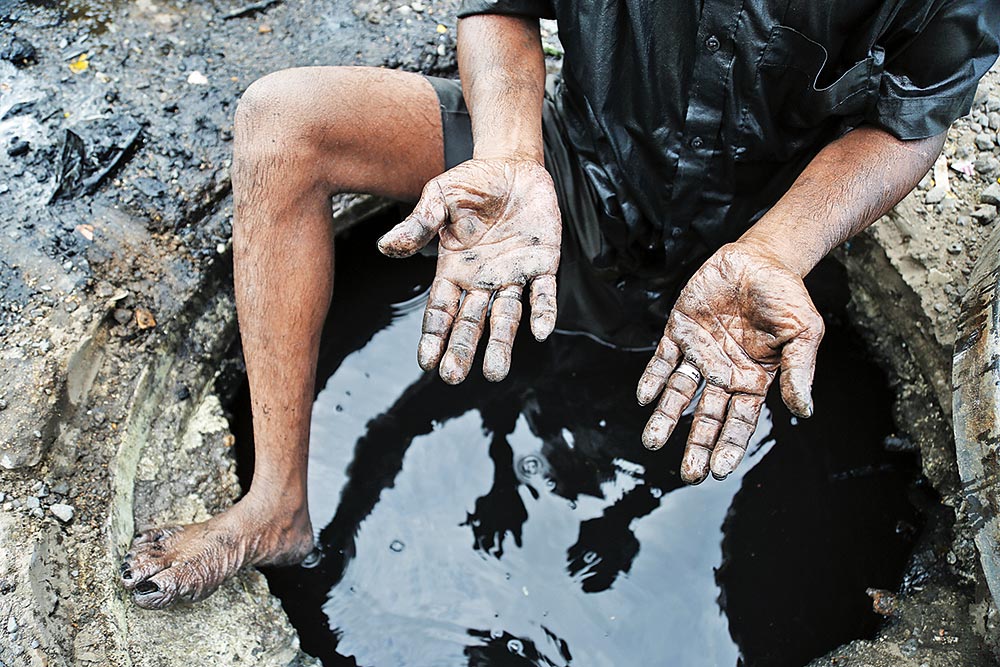About Prohibition of Employment as Manual Scavengers and their Rehabilitation Act, 2013
- It was passed in 2013 to provide for the prohibition of employment as manual scavengers and the rehabilitation of manual scavengers and their families.
- The broad objectives of the act are to eliminate unsanitary latrines, prohibit the employment of manual scavengers and the hazardous manual cleaning of sewer and septic tanks, and to maintain a survey of manual scavengers and their rehabilitation.
- Provisions:
- No person or agency can engage or employ any person for manual scavenging.
- Any person or agency who engages any person in manual scavenging in violation of the provisions of the MS Act, 2013 is punishable with imprisonment up to 2 years, a fine up to Rs. One Lakh, or both.
- It outlines the provisions for the rehabilitation of sanitation workers and their families.
- After a survey of manual scavengers, the local administration must give them a photo identity card with details of their family members and monetary compensation. Their children must get a government scholarship, and they must get a residential plot and money to construct on it.
- It is also illegal for a sewer or septic tank to be cleaned by a person without the employer providing protective gear and cleaning devices and observing safety precautions.
- Under the Act, every local authority must make sure that there are no insanitary latrines in its jurisdiction and no manual scavengers are employed. A local authority is a municipality or a panchayat, which is responsible for sanitation in its jurisdiction.
- Local authorities must construct community sanitary latrines (which don’t require the manual removal of human excreta) and make arrangements for their hygienic upkeep at all times. They must also ensure the use of technological appliances for cleaning sewers, septic tanks and other such spaces in their jurisdictions.
- How do the states ensure the Act is implemented?
- Every state must have a monitoring committee consisting of the chief minister, the minister representing Scheduled Castes and Scheduled Tribes, and the director-general of police, among other officials.
- Every state government or union territory administration must send periodic reports to the central government about its progress on implementing this Act.
- The government has to ensure that local authorities and district magistrates implement the law. For this, a vigilance committee has to be set up at the sub-division, district, state and central levels.
Q1) What is Manual Scavenging?
Manual scavenging is an inhumane practice that involves the removal of human excreta from dry latrines, open drains and sewers using bare hands or brooms.
Source: Union, States duty-bound to the pledge to completely eradicate manual scavenging: SC
Last updated on June, 2025
→ UPSC Notification 2025 was released on 22nd January 2025.
→ UPSC Prelims Result 2025 is out now for the CSE held on 25 May 2025.
→ UPSC Prelims Question Paper 2025 and Unofficial Prelims Answer Key 2025 are available now.
→ UPSC Calendar 2026 is released on 15th May, 2025.
→ The UPSC Vacancy 2025 were released 1129, out of which 979 were for UPSC CSE and remaining 150 are for UPSC IFoS.
→ UPSC Mains 2025 will be conducted on 22nd August 2025.
→ UPSC Prelims 2026 will be conducted on 24th May, 2026 & UPSC Mains 2026 will be conducted on 21st August 2026.
→ The UPSC Selection Process is of 3 stages-Prelims, Mains and Interview.
→ UPSC Result 2024 is released with latest UPSC Marksheet 2024. Check Now!
→ UPSC Toppers List 2024 is released now. Shakti Dubey is UPSC AIR 1 2024 Topper.
→ Also check Best IAS Coaching in Delhi






















